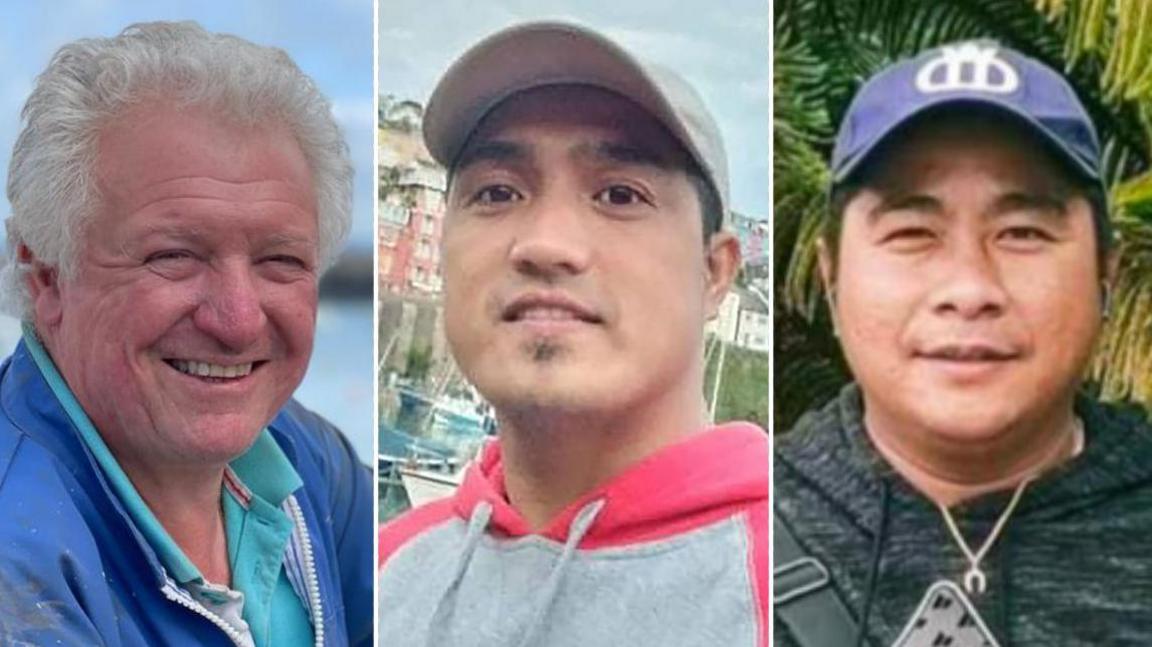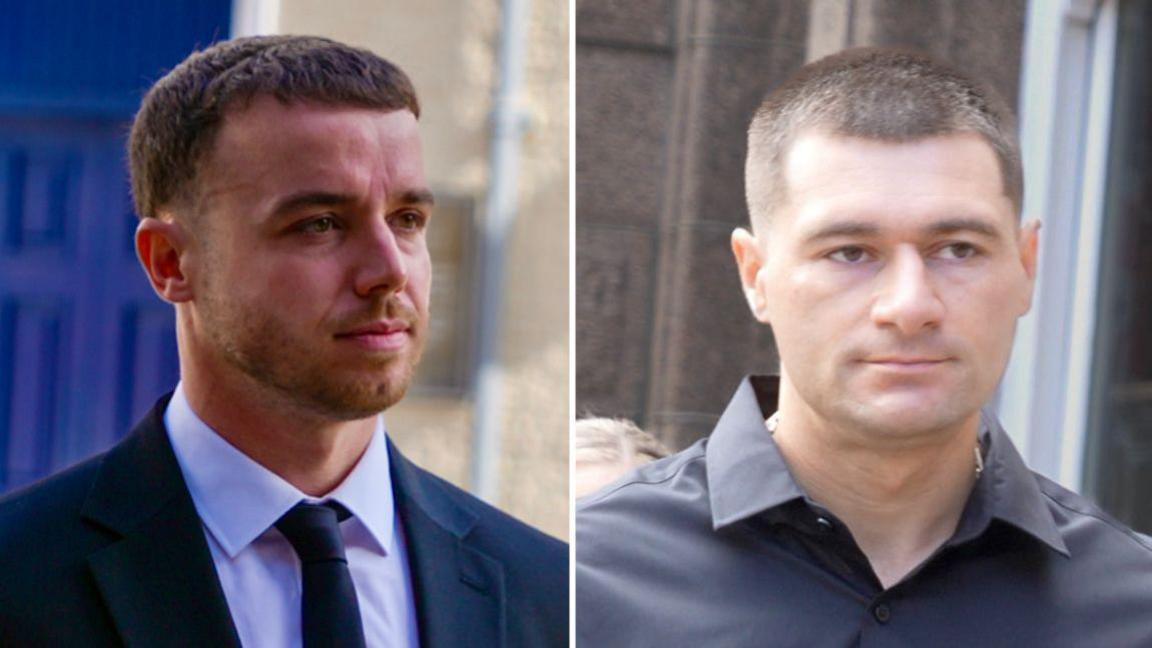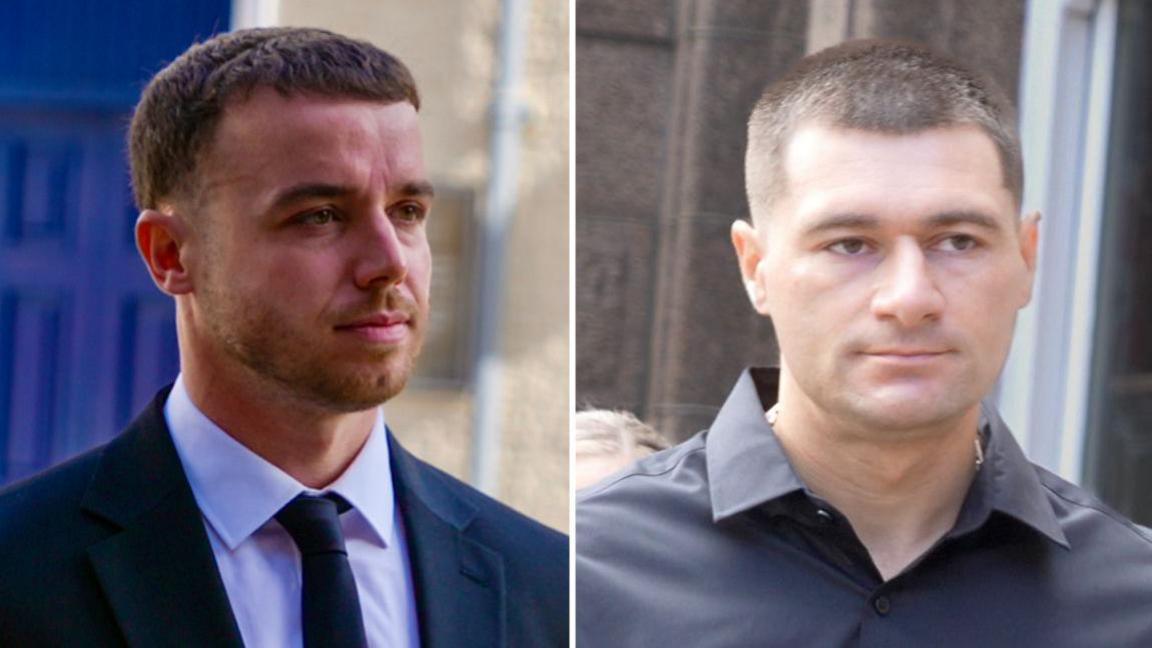Sailor sent 'normal' text 14 minutes before death

Michael Michieli, Jervis Ramirez Baligat and Larry Simyunn died in the collision with a freight ferry in 2022
- Published
A sailor on board L'Ecume II sent a "normal" text to a friend 14 minutes before a collision which saw all three crew members die, prosecutors have told a court.
The fishing boat sank after it collided with the Commodore Goodwill ferry on 8 December 2022.
Artur Sevash-Zade, 35, and Lewis Carr, 30, both deny three counts of gross negligence manslaughter over the deaths of skipper Michael Michieli, 62, and Filipino crew members Larry Simyunn, 33, and Jervis Baligat, 31.
In a continuation of the prosecution's opening statement, Jersey's Royal Court heard Mr Baligat sent "a normal message" to a friend at 05:21 GMT, 14 minutes before the collision at 05:35, to say the crew had set off and there was leftover food in the fridge.
It was the last message and the last time the crew was heard from.
Crown Advocate Matthew Maletroit, for the prosecution, told the jury although "we cannot tell you with any certainty what the crew were doing onboard", the men were "likely readying equipment".
He also noted that, after the vessel was recovered from the seabed, Mr Michieli's body was enclosed and recovered from the machinery room, where the generator used to power deck machinery was located - strongly suggesting he was there when the collision took place.

Lewis Carr and Artur Sevash-Zade are on trial for three counts of manslaughter
The prosecution said the control of the Goodwill was handed over from Captain Zelazny to Mr Carr, the second officer, at about 04:50.
Mr Sevash-Zade started his shift at 05:00 and then broke safe sailing rules by leaving his post as the ferry's lookout to have breakfast just minutes after he started.
Mr Maletroit said that "this was on any view extremely bad practice on the part of both defendants".
The prosecution said Mr Sevash-Zade returned to the bridge 30 minutes before the collision and that while he was on his "unscheduled" break a "clear" radar echo of L'Ecume II had become visible from 05:15 and that its lights "could be seen from good range" on the bridge.
'Incredibly reckless actions'
The court heard that Mr Carr became "distracted by his checklist [and] other pre-arrival actions" instead of taking action based on obvious collision warnings shown on the ship's radar.
During an interview following the collision, Mr Carr said he had identified L'Ecume II by observing its lights and that it was "dead ahead".
He made a seven degree alteration "to ensure the ship would not collide with L'Ecume II", which the prosecution argued "made things worse" and put it on course to collide with L'Ecume II.
"His actions were incredibly reckless, he should have made a much more significant alteration." said the prosecution.
The court heard Mr Carr filled out his paperwork ahead of time by estimating their arrival at the next vantage point. He filled the next arrival at 05:44 when they had not yet been at that location. That note was then followed by the crash in real time at 05:35 GMT.
The prosecution said Mr Carr had also "failed" to manage Mr Sevash-Zade, who instead of looking out had "busied himself with the preparation of the bridge wings".
It added that being out on the bridge had given Mr Sevash-Zade an "ideal vantage point to monitor visually" L'Ecume II.
'Failed to respond'
Audio before the collision was played out to the court - the horn was sounded eight times and "four to five seconds later" the Goodwill could be heard colliding with the trawler.
"Sounding the horn at such close proximity was totally ineffective as a warning," the court heard.
The Goodwill had been in autopilot, which the prosecution said while Mr Carr attempted to steer it out the way, "his own negligence meant he didn't leave himself with enough time to change the steering mode".
Mr Carr "failed" to make any appropriate response after the collision, he did not reduce the ships speed and instead corrected and continued on course to St Helier, the court heard.
The prosecution said his "lack of action" was a "product of his surprise and shock".
At 05:39, "several crew members" had made their way to the bridge and prompted Mr Carr to alert the captain and coastguard for assistance.
The trial continues.
Follow BBC Jersey on X, external and Facebook, external. Send your story ideas to channel.islands@bbc.co.uk, external.
Related topics
- Published1 September
